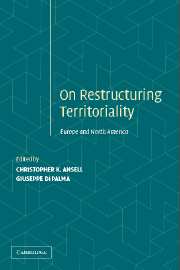Book contents
- Frontmatter
- Contents
- Contributors
- Acknowledgments
- Restructuring Territoriality
- I THEORETICAL FRAMEWORKS
- II THE TRANSFORMATION OF GOVERNANCE
- III EUROPE–U.S. COMPARISONS
- VI CONCLUDING THOUGHTS
- 11 Territoriality, Authority, and Democracy
- Postscript: What Inefficient History and Malleable Practices Say about Nation-States and Supranational Democracy When Territoriality Is No Longer Exclusive
- Reference List
- Index
Postscript: What Inefficient History and Malleable Practices Say about Nation-States and Supranational Democracy When Territoriality Is No Longer Exclusive
Published online by Cambridge University Press: 03 December 2009
- Frontmatter
- Contents
- Contributors
- Acknowledgments
- Restructuring Territoriality
- I THEORETICAL FRAMEWORKS
- II THE TRANSFORMATION OF GOVERNANCE
- III EUROPE–U.S. COMPARISONS
- VI CONCLUDING THOUGHTS
- 11 Territoriality, Authority, and Democracy
- Postscript: What Inefficient History and Malleable Practices Say about Nation-States and Supranational Democracy When Territoriality Is No Longer Exclusive
- Reference List
- Index
Summary
This book focused attention on the restructuring of the territorial bases of public authority and societal interests in the contemporary Western state. We employed two analytical tracers. Stefano Bartolini provides the first, Sidney Tarrow the second. Bartolini employs an exit-voice decoder to highlight the subversion of state-centered territorial order, leading to new forms of territorial representation. Tarrow's attention to the relational, exchange, and opportunity strategies available to institutional actors takes us one important step forward. The underlying forces that unpack the state-territorial container, which Bartolini traces, may be insufficient to map how authority and interests will be reshaped: whether around new territorial venues, functional concerns, or both. Thus, exit-voice analysis benefits when cast in an opportunity structure. Together, Bartolini and Tarrow give us a map to visit the contributions to the book.
Christopher Ansell's introduction uses the map to point out the contributors' shared attention to the restructuring of authority and interests. Personally, I am particularly struck by those parts of Bartolini's and Tarrow's analyses that, together, suggest the open-ended, contingent, still unfathomable direction of restructuring. At the same time, I am reminded that, within the modern Western state, territoriality is bundled with sovereignty and by way of it with democracy. Hence, to raise issues about territoriality and its restructuring is to raise empirical and normative issues about democracy.
I therefore revisit the book by way of a postscript.
- Type
- Chapter
- Information
- Restructuring TerritorialityEurope and the United States Compared, pp. 246 - 270Publisher: Cambridge University PressPrint publication year: 2004
- 1
- Cited by



